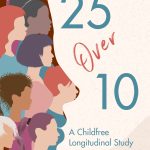Pew Research Center’s recent study on people who don’t have children gives us an informative multidimensional survey of “2,542 adults ages 50 and older who have never had children and 770 adults ages 18 to 49 who don’t have children and say they are not too or not at all likely to have them.” In reviewing it I looked mostly at the separate document with the survey questions themselves for each group and corresponding response percentages. Taking the long view since I started studying people who don’t want children (see Families of Two, my chapter in Voluntary and Involuntary Childlessness: The Joys of Otherhood?, 25 Over 10: A Childfree Longitudinal Study, and the last section of The Baby Matrix) and tracking childfree-related research over time, below are some things that stood out to me with a little commentary.
Sample of 18-49 Age Group Who Are Not Parents and Say They Are Unlikely to Have Children
Life Fulfillment
When asked who has it easier — people who don’t have children or people who do, seventy-seven percent of respondents in this group chose the option: “doesn’t have much to do with having children.” I like to think that this is a sign that more people are seeing through the pronatalist Fulfillment Assumption (see The Baby Matrix) and to the reality that parenthood can be one path to fulfillment in life.
Major Reasons for Not Having Children
On this item, fifty-seven percent responded a major reason is that they “just don’t want to.” In my interviews two plus decades ago with childfree people this was harder for them to directly come out and say! I say this high of a percentage is a sign that more people are more comfortable being honest about this reason to make the childfree choice.
Forty-four percent responded that they wanted “to focus on other things, like [their] job or other interests.” In the last two decades, this has been a common reason childfree people express as a reason they don’t want children.
Thirty-eight percent responded “concerns about the state of the world, other than the environment.” Childfree couples I’ve interviewed since the late 90s did not specifically speak to this reason. While not in the top three reasons, concerns about overpopulation were concerns made by some, but not as important as just not having the desire to parent.
Work-Related Experiences
When asked about having “felt left out of conversations with coworkers who have children,” seventy-one percent responded “No.” Sixty-five percent responded “No” to ever having been “expected to take on extra work or responsibilities.” Both of these percentages are higher than I would expect. In my interviews and seeing in social media for many years now, childfree women (in particular) feeling left out and being expected to take on more has been common commentary.
Sixty percent responded “No” to having been given less flexibility than people with children. This too is different than common commentary out there, e.g., childfree people experiencing parents getting more flexible work hours and having an easier time taking time off for child-related responsibilities.
Perhaps this points toward some current-day progress of the experiences of people who aren’t parents in the workplace.
The Topic of Having Children in Conversation
Sixty-eight percent responded that this topic came up with friends “rarely” or “never.” Seventy-two percent responded that it came up “rarely or “never” with their parent(s). That’s pretty high.
The Dating Scene
When asked what impact they think being unlikely to have children has had on their dating life, seventy-eight percent responded “neither positive or negative.” A good sign.
Sample of Age 50 or Older Who Are Not Parents
Here are a few percentages that stuck out to me in this sample group:
Thoughts on Having Children
When asked what best describes their thoughts on having children, thirty-eight percent responded there was a time when they wanted children. Thirty-two percent responded they never had wanted children. Twenty-five percent responded they weren’t sure whether or not they wanted to have children.
Regarding those who responded that had never wanted children, thirty-two percent is higher than other numbers we have seen over time. For many years, census numbers have hovered at about one in five of women ages forty to forty-four who did not have children without delineating the reason(s). On the other side, for over sixty percent of respondents it was not always the case that they did not want them. This lends credence to the value of longitudinal study to hone on these experiences.
Major Reasons for Not Having Children
For the item asking the major reason they did not have children, thirty-nine percent responded that “It just never happened,” thirty-three percent responded they “didn’t find the right partner,” and thirty-one percent responded they “just did not want to.” It’s great to finally be getting more research delineations like this!
Pressure
When asked when they were younger, how often did they feel pressure from spouse/partner, family, friends, and society in general, responses ranged eight percent or less for “extremely often”/“very often” and forty-three to fifty-seven percent “Never.” This suggests a sign of progress!
Impact on Relationships
When asked how has not having children impacted their relationships, sixty-four to seventy-seven percent responded that it has had neither positive nor negative with these groups: their spouse/partner, friends with children, parents, and siblings. This suggests this may be experienced less now than in the past.
Worry About the Future
For the item asking how much they worry about the future in certain areas, forty-four percent responded either “rarely or “never” to worrying about being lonely as they age. This decent percentage runs contrary to the pronatalist messaging that those with no children will be lonely in their elder years.
Parent Care
When asked how much of a reason are certain factors for why they would provide more care for their parents than their siblings, the highest major reason response was forty-seven percent for saying they would due to “living closer” to their parents than their siblings. Almost half — forty-nine percent — responded that not having children was not a reason that they would provide more care for their parents than their siblings. This goes contrary to common thinking and what many childfree people have shared in interviews over the years.
The Two Group Sample
While the survey gives us a good deal of interesting information about two large age-range groups, a more specific breakdown by age in the 18 to 49-year-old sample group would have told us more and possibly better explained some percentages in this study that seemed higher than expected. For example, a sample divided into ten year age increments (and by gender), may have told us more about how the experiences of those on the younger end versus those on the older end of the age spectrum of this sample group.
A longitudinal look would also tell us even more about people’s thinking and experience. Think about it; an eighteen year-old’s thinking can be very different than a forty-nine-year old! In my longitudinal study (the only one I know of to date) that tracked twenty-five women over ten years starting in their twenties, twenty-four percent had what I termed ‘shifts in sureness’ about not wanting children over the course of the study. Their answers to the questions I asked them each year changed over time. See 25 Over 10 for these stories and where they landed at the end of the study (and many other interesting findings).
I know that many childfree people get frustrated when others claim they will change their minds about kids in time, but the truth is life evolves and so can feelings. Research has shown that “early articulators” or those who know early in life they don’t want children are more likely to not change their minds, but more study needs to be done in general about the experiences of those with the intent not to have children and the evolution of their reproductive lives over time.
Final Note
I have also noticed a good number of articles discussing this research saying it has indicated a growing number of people “are choosing not to have kids” or something similar. I would contend that more accurately, the Pew Research Center study found that forty-seven percent of adults between the ages eighteen and forty-nine who don’t have children responded “they are unlikely to ever have children in the future.” The former wording suggests the choice has been fully made; the latter wording reported in the study indicates intention. It’s important to describe the results as the research states it.
All and all, this Pew Research Center study sheds 2024 light on a good number of areas related to research on not having children!




